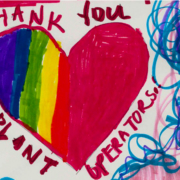Expressions of gratitude and support have poured in from a grateful community to the ten volunteers sheltering in place at the Claude “Bud” Lewis Carlsbad Desalination Plant in San Diego County. As people learned about their effort to maintain plant operations and keep the water flowing during the COVID-19 pandemic, residents responded by expressing their heartful thanks through messages, photos and artwork.
“The desal plant employees were overwhelmed with the community support they have received,” said Jessica Jones, Poseidon Water director of communications. “They read and enjoyed every message, photo, and drawing. The support was just the boost in morale that they needed to finish out their 21-days onsite.”
The on-site crew has sustained plant operations and maintenance since March 19 to ensure continued production of high-quality drinking water, in compliance with all state and federal drinking water standards.
Messages and artwork shared with the workers
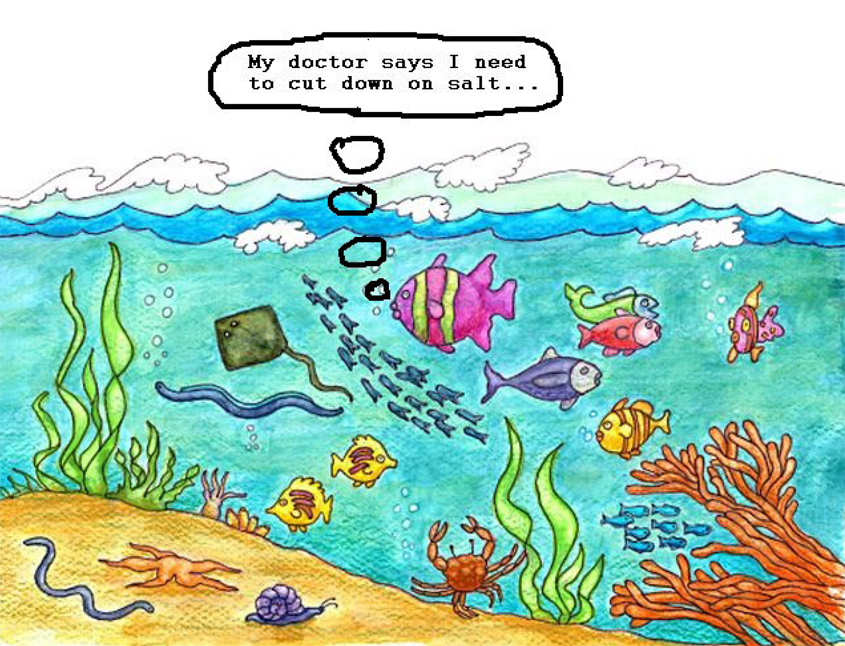
Lori, a resident of Rancho Carlsbad, put her artistic skills to use with this entertaining thank you. Courtesy: Poseidon Water
Rachel Welland, Bay Park: “Each day I think about how crucial our water supply is, as we are all quarantined in our houses. I appreciate what you are all doing to keep us hydrated during these crazy times!”
Lucy Lusk, South Carlsbad: “Well I will never take that water that comes out of the faucet for granted again. Thanks for volunteering to stay at the desal plan to keep it running, we are grateful to you for your service to our community.”
Diane, Spring Valley: “Thank you for providing us clean water. I know how important your job is, because when I was growing up in the Philippines, there was no water, and we have to buy water by the drum. I’m sure your loved ones miss you terribly.”
The Adams Family including Mom, Dad, and three kids ages 7, 10, and 12: “Thank you for your personal sacrifice serving the surrounding communities. Water is precious. Water is life. Thank you for committing to keep our water safe and available.”
Kids put their talents to work
Kids got out their paintbrushes, pens, and even sidewalk chalk to let the workers know how much they were appreciated.
Miles Antoine, age 7, Chula Vista: “Thank you for helping everything grow!”
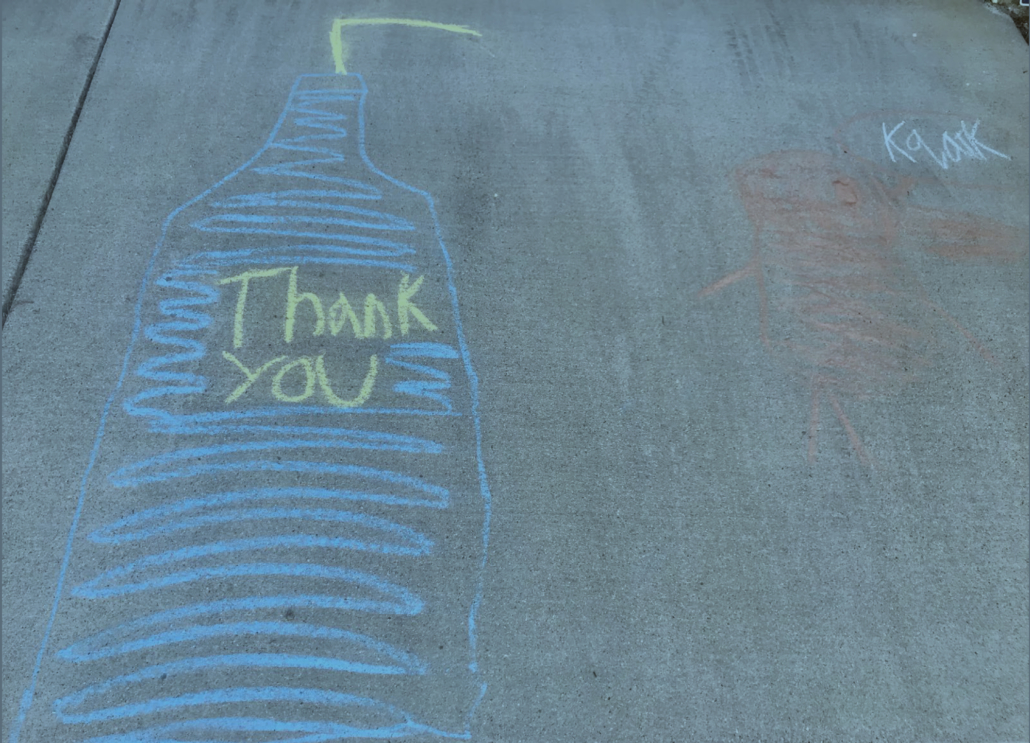
Miles Antoine, age 7, Chula Vista: “Thank you for helping everything grow!” Courtesy: Poseidon Water
Dylan, age 21 months, Carlsbad: “Thank you for helping provide us fresh water.”
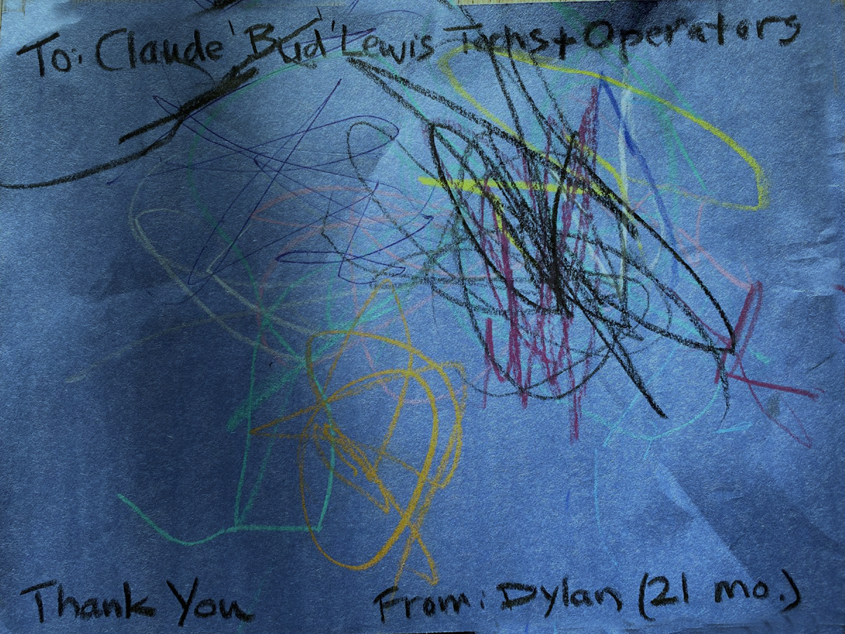
Dylan, age 21 months, Carlsbad: “Thank you for helping provide us fresh water.” Courtesy: Poseidon Water
Zoe, age 10, Encinitas: “Thank you for being away from your families and keeping our water safe.”
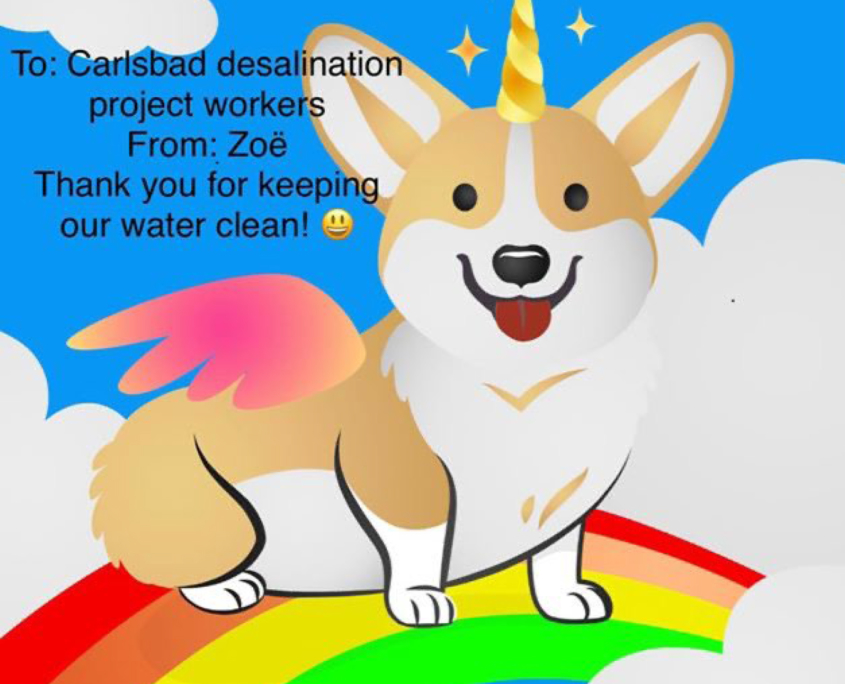
Zoe, age 10, Encinitas: “Thank you for being away from your families and keeping our water safe.” Courtesy: Poseidon Water
Colson Hanson, age 6, Scripps Ranch: “Thank you for the hard work and staying at the plant so we have clean water.”
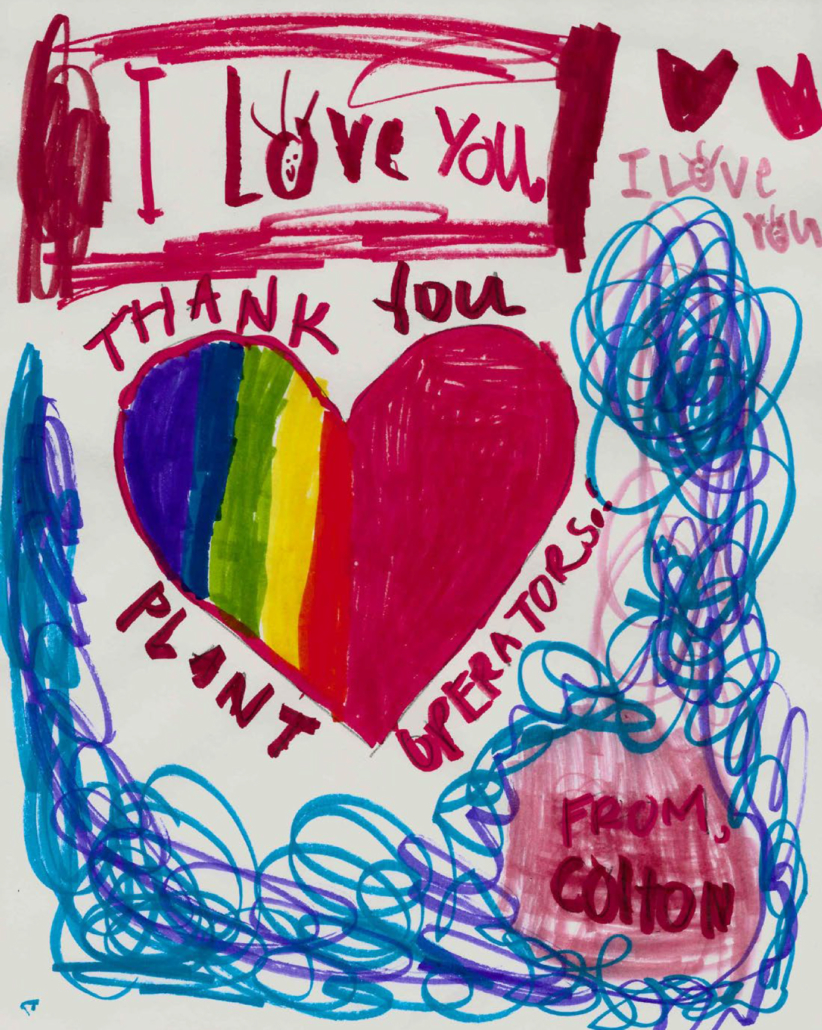
Colson Hanson, age 6, Scripps: “Thank you for the hard work and staying at the plant so we have clean water.” Courtesy: Poseidon Water
Heartwarming expressions of thanks
One resident was moved to write a poem for the desal plant workers.
Samantha, Carlsbad:
“Claude ‘Bud’ Lewis Desal Operators and techs showing some grace,
Changing your lives to Shelter in Place.
Missing your families and your comfortable bed,
I hope the City of Carlsbad keeps you well fed.
Toiling with coworkers for 12 hour shifts,
I only imagine there could be some rifts.
50 million gallons per day you give,
Without this water we could not live.
How long to stay? The time isn’t clear,
For your courage and hard work, I send you good cheer!”
Happy puppy
A 10-month old pup in Little Italy named “Archie Moore” had his owner provide a photographic thank you.

With a little help from his owner, this happy pup is thankful for a full water dish. Courtesy: Poseidon Water
Yen Linh Huynh, California: “Our hearts go out to you at the desal plant. It’s heroes like you that give humanity hope for a better day. Thank you from this family of 4.”
Barbara Blash, Oceanside: “Thank you so much for your efforts to keep our little corner of the world turning. Hope my small note will generate a warm smile until the time when a heartfelt handshake or hug will be delivered.”
Paul Maxwell, San Diego: “Hey Operators I’m a Paramedic in San Diego and you are my hero! Thanks for stepping up!”
Martie Hatcher, Carlsbad: “Please let your families know that they are so appreciated for this gift of you. I know they really miss your hugs, smiles, laughter and company!! On behalf of my husband and I, ‘Tussen tac,’ Norwegian for ‘a thousand thanks!”‘
Melanie, Carlsbad: “The world is better for having people like you in it.”
Another group of employees stands ready to relieve the ten workers later this week when their 21-day commitment ends.
The San Diego County Water Authority purchases up to 56,000 acre-feet of water from the Carlsbad plant per year – enough to serve approximately 400,000 people annually. The plant is a major component of the Water Authority’s multi-decade strategy to diversify the county’s water supply portfolio and minimize vulnerability to drought or other water supply emergencies.

